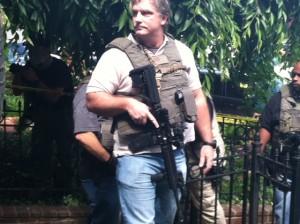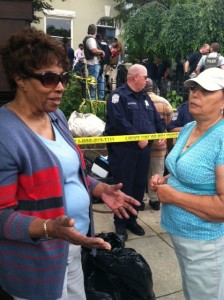If evictions continue to be this costly there’s likely to be fewer of them.
Tuesday, law enforcement used no less than forty-five officers and thirty vehicles to evict a woman from her house in northeast D.C. For good measure, at least two officers carried assault rifles and at times a helicopter hovered above.
D.C.’s Metropolitan Police Department mostly looked on and secured the area as a phalanx of U.S. Marshals dislodged activists who were attempting to prevent the eviction.
The U.S. Marshals, whose names and badge numbers were not visible, appeared to employ a strategy of maximum-force-with-minimal-paperwork, as evidenced by the absence of arrests despite numerous serious skirmishes.
As the officers approached Dawn Butler’s home at 917 Maryland Ave, NE, Dawn’s mother was being interviewed. “They do whatever they want to do with impunity,” Anne Butler said to the cameras.
In the ensuing mayhem, several activists were injured, one quite seriously, and an officer sustained an injury to his face. A witness said the officer was injured as he broke down the front door which was barricaded with milk crates.
Tuesday’s action was organized by Occupy Our Homes, an off-shoot of Occupy DC which focuses on foreclosure defense and has been assisting Butler for several months.
Before the confrontation, Occupy Our Homes member Marc Smith said, “We want to do everything possible for this person not to lose her home.”
As he spoke, Smith and fellow Occupy activist Ricky Lehner were on opposite sides of a metal-gated-door leading to Butler’s basement with their arms chained together inside a PVC pipe, a tactic they referred to as a “tootsie roll.” 
Asked how he’d like to see the standoff end, Lehner said, “Ideally we’d uncuff each other because the cops leave.” But that’s not how things played out.
Lehner, who wasn’t seriously injured, described being threatened with a Taser gun and watching helplessly as his arm-mate was violently pulled “from the neck and head.”
In a phone conversation with TheFightBack after he was released from Howard University Hospital, Smith said the last thing he remembered before being knocked unconscious was one officer telling another that Lehner and Smith were locked together and therefore continuing to pull on Smith’s neck was futile. Smith then recalled the second officer saying, “If they got themselves into this they can get themselves out.”
“We used appropriate force necessary to enforce the court ordered eviction,” U.S. Marshal spokesperson Lynzey Donahue said in a brief phone conversation with TheFightBack. After repeating this same response to several different questions, Donahue then abruptly hung up.
Butler returned from court Tuesday morning to find her belongings being hauled onto the sidewalk in garbage bags as a small army stood guard. “We’re going to sue,” she said.
Since 2006, Butler lived at 917 Maryland Ave, NE where she had an arrangement with the property owner, Paxy Harry: In lieu of monthly payments Butler made improvements to the property, which ended up totaling $200,000, according to Butler’s pro bono attorney Ann Wilcox, who’s associated with the National Lawyers Guild.
The arrangement worked well until 2009, when J.P. Morgan Chase foreclosed on the property. To assist with the foreclosure, Chase hired Rosenberg and Associates, a Bethesda-based law firm which Butler characterized as a “foreclosure mill.” The firm didn’t respond in time for publication.
The signature conveying ownership from Harry to Rosenberg and Associates belongs to Liquenda Allotey, noted WMAL. “Liquenda Allotey has shown up in many, many court cases and he is recognized as a robo-signer,” Anne Butler, who’s a former D.C. real estate commissioner, told WMAL’s Martin Di Caro in May.
Indeed, Allotey’s signature, which is no more than a zigzag line, has appeared on thousands of mortgage assignments. Allotey’s former employer, Lender Processing Services (LPS), faces serious legal challenges and accusations of fraud, as a 2010 Reuters’ report laid out.
Sometime after the 2009 foreclosure, Bank of New York purchased the property from Chase.
Irrespective of the disputed ownership, thanks to D.C.’s strong tenant protections Butler couldn’t be evicted as a result of the foreclosure if she had a valid lease, but the courts ruled that she did not.
The court’s ruling not only led to Butler’s eviction, but it denied her “the right of first refusal,” which gives tenants the first opportunity to purchase a property when it’s put up for sale.
Bank of New York further benefited from the invalidation of the lease, Wilcox said, because it had a provision in it requiring Butler to be repaid $200,000 if the house was sold.
Standing on the sidewalk after he was forecefully removed, Lehner said, “They just brutalized us to kick a lady out of her home. That’s the country we live in?”
Other News Coverage:
WUSA 9: US Marshal, Occupy DC Protester Injured in Controversial Eviction
ABC 7: Occupy protesters try to halt eviction
Related Stories:
Bank Don’t Need Homes, People Do: The Case of Deborah Harris, June 5, 2012
Freddie Mac, “Can You Hear Me Now?” Feb. 29, 2012


